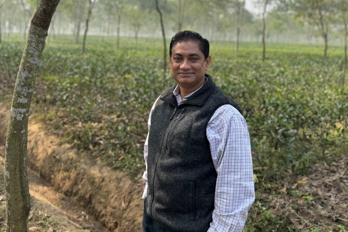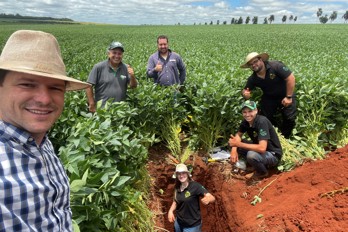International Women’s Day 2023
Whilst speaking with Joyce she sits in an office in the technical department at EPK (Eastern Produce Kenya) where many different business areas work, research and development, compliance, forestry activities, and soil analysis lab.
She smiles - “The senior lab technician is female – that tells you all you need to know.”
Joyce Mageto, Senior CSR Manager, Eastern Produce Kenya.
A social science graduate and community development practitioner, Joyce has just over 15 years professional experience spanning across community development, gender, children’s rights and in the last 5 years has gained a large amount of experience at EPK in corporate communication and environmental sustainability. She now holds the role of Senior CSR Manager.
Joyce spends much of her day engaging and exploring with community members and various stakeholders on development issues across the whole of EPK and their surrounding environments.
“Conversations that inspire change, that realise community development, actual implementation, not just stories.”
I asked Joyce to share some details of initiatives that she has been involved in.
“There are so many, At EPK we know the future is inclusivity. Our goal is to create a culture where all voices are heard, and all talent feels respected.”
Joyce continued, “I am particularly proud of how we have been expanding conversations around gender equality, tracking and monitoring our data by gender, as we consider targets to put in place to improve gender equal representation across all levels of employment.”
A driver of positive change
EPK is a proud driver of positive change not just internally but more widely in the tea/ agriculture industry. The company work towards gender equity and equality in several programmes including, SHARP, Sexual Harassment Prevention and Reporting Programme and TABASAMU, a menstrual health and hygiene programme.
“For EPK, TABSAMU is not just about donating sanitary towels, it is to make sure simple opportunities for fun and adventure are realised by young girls and women as well as ensuring comfort at the workplace.”
Joyce spoke of her own experiences growing up, “I would think like what if I’m playing and my pad falls down? There was that fear. So, you limit yourself, you do not have fun, play with other children. For EPK, what we want to see is that our adolescent girls do not miss opportunities, and our female employees do not miss opportunities at work just because they are on their period.”
As well as programmes focussing on gender specific improvements, EPK’s CSR initiatives cover many areas including education and health care. We spoke of the changes within the education system in Kenya and the challenges this has created with infrastructure.
“When children attend school and progress, they end up contributing meaningfully to the community. Just recently we have put a lot of focus on ICT looking at how to narrow the digital gap, working with schools to set up computer labs. Science is also a focus, as there is a big shortage of science labs.”
The importance of equity
EPK employed their first female manager back in the 90’s. Today, gender visibility across the cadres of management is a true demonstration that that one female candidate accelerated the pace and set the stage for sustainable gender representation, participation, and leadership in the tea sector.
“There are all these negative thoughts about the ability, that is to say, agriculture’s ability to accommodate female candidates. I think EPK is speaking a different language and sending a different message, that accommodating female employees is a benefit to the business providing a diverse, versatile workforce. The challenge big time has been the negative mindset but also it is made worse by us women thinking, I can’t. You know we are our own worst enemies. We must bring ourselves to the fore of the business and demonstrate that we can deliver to the best of our ability just like our male counterparts.”
We discussed if the work being done at EPK reflects similar initiatives elsewhere in Kenya
“EPK has always been forward sighted and way ahead of the game on initiatives that enhance community relations.”
EPK, like all the Group’s operations, value their neighbours. Which is why they engaging with them regularly to ensure that together they can address a variety of social issues and bring development for all is so important.
EPK ensure that their CSR portfolio is sustainably resourced both by the company and other partners, with the bigger partner being their neighbouring communities. This is what sets EPK apart in terms of CSR.
She quoted Camellia “The local community give us license to trade and it is our aim to build on that trust.” So yes, being a part of Camellia has a positive impact on the work that we do. Our CSR initiatives are anchored in sustainability and that means the future generations can utilise the same resources.
If this is not custodianship, what is?!”
What are the next steps for CSR initiatives?
Joyce explained what she believes are the next steps to improve gender equity further in the tea industry.
“Changing the gender landscape is a sure step to improve equality and equity in the tea industry. We need to establish environments that can support and sustain that change.”
At EPK, policies including recruitment and code of conduct are their guides to the commitments being made to realise gender equality.
At EPK 31% of female managers run their divisions which is double what it was in just 2019. With many senior positions being held by women so much change has already taken place within EPK.
We spoke about Joyce’s aspirations for 2023, for herself, EPK and the agriculture sector.
“I aspire to be at the fore of the business, since that is a platform that enables collaboration, decision making and implementation of holistic approaches to addressing gender equity at the workplace and in the entire agriculture industry.”
“The agriculture industry is on a continuous improvement journey of protection against climate change. What I hope to see, is a move from action to outcomes by continued use of sustainable agriculture practices. It will be good to see increased crop yields as a result of promotion of soil health, water conservation and biodiversity.”
In conclusion
It is clear that creating equal opportunities for women within EPK is having positive consequences. Not just because of the brilliant role model and example Joyce has set, but because having a more diverse group of employees offers different perspectives that ultimately support better business decision-making. EPK’s focus on removing barriers to women, will support the prosperity of the business and community alongside other initiatives, such as sustainable agriculture practices and increasing access to education and health provisions. EPK actively engage in learning in this area but realise it is an evolving landscape. There is still a lot of work to be done but these measures all have one thing in common, and that is long termism.




